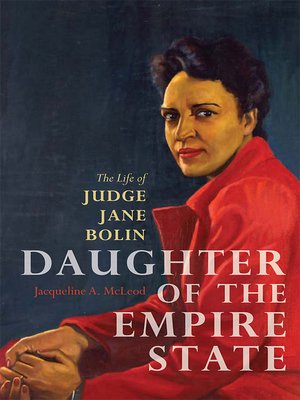
Sign up to save your library
With an OverDrive account, you can save your favorite libraries for at-a-glance information about availability. Find out more about OverDrive accounts.
Find this title in Libby, the library reading app by OverDrive.



Search for a digital library with this title
Title found at these libraries:
| Library Name | Distance |
|---|---|
| Loading... |
Bolin was appointed to New York City's domestic relations court in 1939 for the first of four ten-year terms. When she retired in 1978, her career had extended well beyond the courtroom. Drawing on archival materials as well as a meeting with Bolin in 2002, historian Jacqueline A. McLeod reveals how Bolin parlayed her judicial position to impact significant reforms of the legal and social service system in New York.
Beginning with Bolin's childhood and educational experiences at Wellesley and Yale, Daughter of the Empire State chronicles Bolin's relatively quick rise through the ranks of a profession that routinely excluded both women and African Americans. Deftly situating Bolin's experiences within the history of black women lawyers and the historical context of high-achieving black New Englanders, McLeod offers a multi-layered analysis of black women's professionalization in a segregated America.
Linking Bolin's activist leanings and integrationist zeal to her involvement in the NAACP, McLeod analyzes Bolin's involvement at the local level as well as her tenure on the organization's national board of directors. An outspoken critic of the discriminatory practices of New York City's probation department and juvenile placement facilities, Bolin also co-founded, with Eleanor Roosevelt, the Wiltwyck School for boys in upstate New York and campaigned to transform the Domestic Relations Court with her judicial colleagues. McLeod's careful and highly readable account of these accomplishments inscribes Bolin onto the roster of important social reformers and early civil rights trailblazers.
| Cover Title Page Copyright Page Contents Preface Acknowledgments 1. Her Standing in Poughkeepsie: Family Lineage and Legacy 2. On Her Own: The Years at Wellesley and Yale 3. Politics of Preparation: The Making of the Nation's First African American Woman Judge Illustrations after page 42 4. Politics of Practice: An African American Woman Judge on the Domestic Relations Court 5. Speaking Truth to Power: A View from the Bench of Judge Jane Bolin 6. Persona Non Grata: Jane Bolin and the NAACP, 1931-50 Epilogue Notes Index back cover | "Jacqueline A. McLeod not only premieres the public life of Jane Matilda Bolin but also bridges some of the gaps that exist in studies of lawyers who are most likely to be male and of female lawyers who are most likely to be white. This is an engaging work that will be of interest to scholars of women's history and African American history as well as legal studies and the history of social and political reform." —Stephanie J. Shaw, author of What a Woman Ought to Be and to Do: Black Professional Women Workers During the Jim Crow Era"McLeod draws on archival material and an interview with Bolin to rescue from obscurity this juvenile-justice activist and pioneer in the advancement of African Americans and women in the legal profession."—Booklist
"Daughter of the Empire State accomplishes what any good first biography should do."—The Journal of American History
|Jacqueline A. McLeod is a professor of history and Africana studies at Metropolitan State University of Denver and coeditor of Crossing Boundaries: Comparative History of Blacks in Diaspora.







